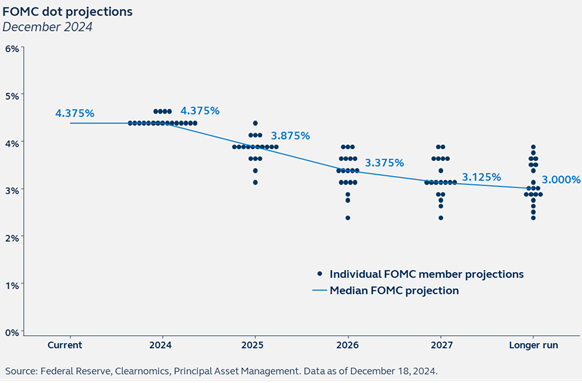Another Fed rate cut, but policy uncertainty ahead
At its December meeting today, the Federal Open Market Committee decided to lower the benchmark policy rate by 25 basis points to 4.25%-4.50%, its third consecutive reduction in rates. However, in recognition of both solid economic data and sticky inflation data (plus a nod to increased inflation uncertainty from the incoming administration’s policy proposals), Fed Chair Jerome Powell signaled that the Fed is very likely to slow the pace of easing from here.
The median forecast in the Summary of Economic Projections (SEP) showed upward revisions to growth and inflation, downward revisions to unemployment, and the dot plot showed just two more 25bps cuts in 2025 (versus four cuts in the September dot plot).
My, how quickly conditions change
Since the Fed started to reduce rates three months ago, economic activity and labor market data has strengthened, and inflation progress has stalled. Furthermore, tariff and immigration proposals from President-elect Trump have raised fears of a renewed increase in inflation next year. Against that backdrop, Fed speakers have been sounding increasingly cautious, pointing out that there is no need to rush policy rates to neutral and instead a more patient approach may be warranted. Perhaps that initial oversized 50bps move was a bit unnecessary…
Powell’s assessment
Fed Chair Powell “feels very good about the economy” but, as the labor market is still cooling, it requires careful watching—the Fed does not want to see any further deterioration in the jobs market. By contrast, with inflation deceleration having stalled of late, the Fed needs to see further progress towards its target before making additional rate cuts.
On policy, Powell pointed out that the 100 basis points reduction in rates so far means that their policy stance is considerably less restrictive—yet, he also added that interest rates were still “meaningfully restraining economic activity.” On balance, his economic assessment painted a confusing picture—growth is very robust but may potentially need some more assistance, yet the Fed requires additional progress bringing inflation down before they can deliver any further support. If anything, he sounded like a Fed Chair who could leave policy rates on hold for a prolonged period, only cutting once they have proof that inflation is declining again.
Powell was asked a number of times about the inflationary impact of the incoming administration’s tariff proposals. His answers emphasized the uncertain nature of the impact, noting that all FOMC members were undertaking rigorous analysis so that they would be ready to respond if and when policy is actually implemented. But he did admit that, for some FOMC members, the potential policy impact had already been incorporated into their economic projection revisions.
Updates to the Summary of Economic Projections
The new Summary of Economic Projections (SEP) saw some meaningful revisions.
- The GDP growth forecast for 2024 was revised up from 2.0% to 2.5%, and from 2.0% to 2.1% in 2025.
- The unemployment rate forecast was downwardly revised from 4.4% to 4.3% in 2025 (up from 0.1% from where it currently sits), and then remains at 4.3% for the next few years.
- The core PCE inflation forecast was raised from 2.2% to 2.5% in 2025, and 2.0% to 2.2% in 2026, only hitting the 2% target in 2027.
- Notably, only 3 of 19 participants project inflation under 2.5% in 2025.
There were also major changes to the dot plot:
- Although the decision has been made to cut rates today, the dot plot showed that 4 of 19 participants believe rates should not have been cut. We know there is one voting member who dissented, suggesting that the other 3 were non-voting members.
- The median projection sees just 50 basis points of cuts in 2025, taking the fed funds rate down to 3.9% by end-2025—the September dot plot had projected 100bps of cuts.
- 10 of 19 participants see 50bps of cuts next year.
- Just 5 of 19 participants see 75bps of cuts next year. One participant sees no cuts in 2025.
- The median dot for 2026 then falls to 3.4%, equivalent to another 50 basis points of easing.
- The median dot sees one more cut in 2027, taking the policy rate down to 3.1%. If this forecast materializes, this will be a very shallow, drawn-out, rate cutting cycle.
- The median longer-run dot was raised once again, from 2.9% to 3.0%.
There was significant dispersion in the long-run dots, ranging from 2.4% all the way to 3.9%—a reflection of the considerable uncertainty around measuring neutral. This implies that the Fed will need to be increasingly cautious about its easing path, with an elevated risk of policy error.

Policy outlook
The decision to cut rates today is not a surprise in itself. But, in light of the significant revisions to the projections, it does suggest that this was a reluctant rate reduction. Certainly, the economic and inflation backdrop is not one that screams a need for meaningful policy stimulus, and tariff policy uncertainty implies that the Fed now needs to tread very cautiously.
We expect the Fed to slow its cutting pace, passing on January and waiting until the March meeting before lowering policy rates again. Evidence of cooling labor demand suggests to us that the Fed is likely to cut policy rates three times next year (rather than the two included in the dot plot)—however, it is not difficult to imagine a scenario whereby new tariffs prompt the Fed to enter a prolonged pause period. Policy uncertainty is particularly elevated going into 2025.
Principal Asset Management

